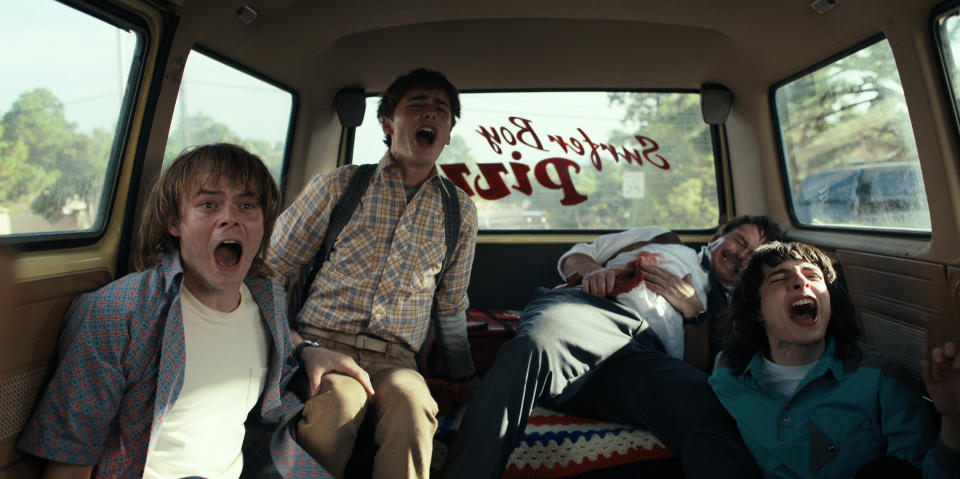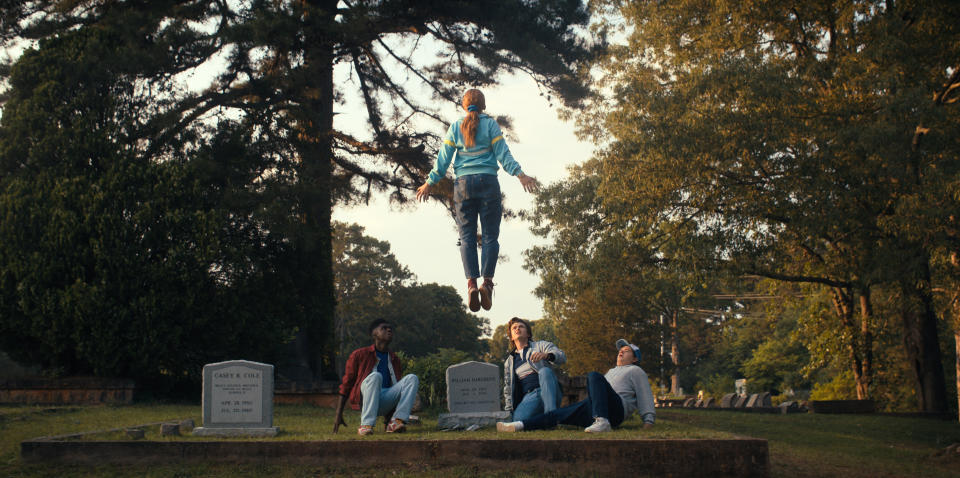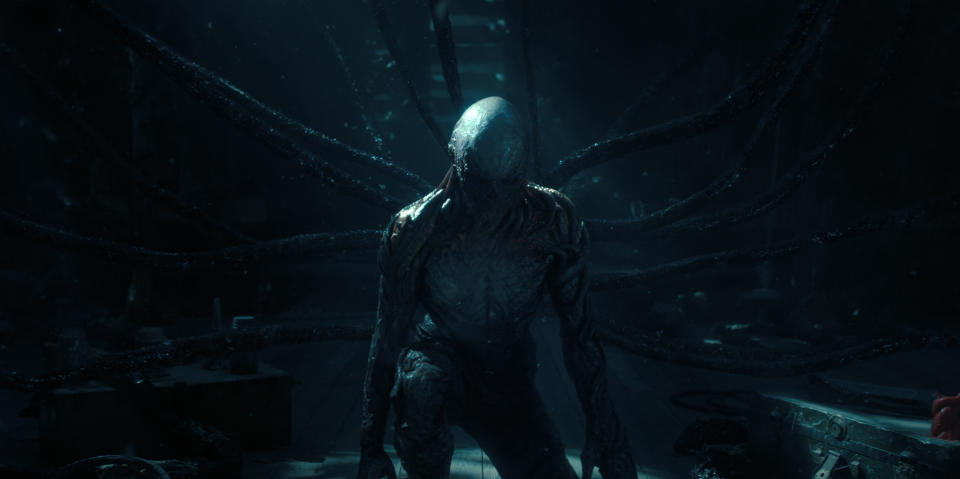The Duffer Brothers Think They’ll Stay Away From New Characters in ‘Stranger Things 5’

- Oops!Something went wrong.Please try again later.
- Oops!Something went wrong.Please try again later.
Welcome to It’s a Hit! In this series, IndieWire speaks to creators and showrunners behind a few of our favorite Emmy-nominated television programs about the moment they realized their show was breaking big.
Despite it having the same opening weekend as their fourth season, “Stranger Things” creators Matt and Ross Duffer saw the success of “Top Gun: Maverick” as a bit of a reflection of their own success.
More from IndieWire
Lizzo Explains How Making a 'Positive' Reality Competition Show Became 'Provocative'
'Never Have I Ever': How 'Himbo Stoner' Trent Became a Fan-Favorite Character in Season 3
“It obviously did crazy well, and it’s such a throwback movie. The nostalgia works for the older generation, those of us who grew up with ‘Top Gun,’ but it’s also resonating with everybody. And the storytelling is so, so traditional Hollywood blockbuster, and it exploded,” Matt Duffer said during a Zoom interview with IndieWire. “It’s not trying to do anything super fancy. It’s just trying to tell a good, simple story. That’s where I’m like, ‘OK, this type of storytelling is still working.’ That’s great. That’s the storytelling I love, and I don’t know how to do anything else.’”
The twin showrunners did not expect their ‘80s nostalgia-laced sci-fi horror Netflix series to resonate with audiences the way it has, and they continue to be surprised by its accomplishments, with Season 4 breaking Netflix records and netting 13 Emmy nominations, including Outstanding Drama Series. Matt added that seeing their show, and other projects like “Top Gun: Maverick,” that nod to the golden era of original blockbusters do so well this summer has been a relief. “It’s like, ‘OK, I don’t have to pretend I like this other stuff. I can just keep doing and telling the type of stories that I love and know how to tell.’”
This interview has been edited for length and clarity.
IndieWire: When did you realize “Stranger Things” was becoming a hit? Was that clear during Season 1?
Matt Duffer: Well it’s funny, when I think back on it, it was more of a slow realization. It definitely felt like Season 1 had the snowball [effect]. It was probably the whole Barb phenomenon. Ross and I didn’t really understand social media at all at the time, but [there were] a bunch of articles, and then enough people told Ross and I that this isn’t normal, what’s happening. But Netflix also took a really long time to tell us that we were doing OK. And that was a time when they didn’t give numbers, right? They would just say “We’re very happy.” So officially, we got “We’re very happy.” Then “Saturday Night Live” was the other big one, where it was like, “That’s crazy.”

Courtesy of Netflix
Did it feel the same way this season? Or did this season start to resonate with people before you all had even woken up that Friday that it came out?
Ross Duffer: Yeah, it’s weird that you can get real-time, very quick feedback. The people that are staying up and watching eight hours of “Stranger Things” that night, that’s our hardcore fanbase, so you can’t necessarily go off those reactions. But I remember just being excited. You could immediately see what was resonating, whether it was the Max stuff, and “Dear Billy…” and Kate Bush, or the twist in Episode 7. So there was a bit of a relief that, even in that early group of viewers it was resonating, at least those moments. Obviously the Kate Bush thing gave us our feedback. Our barometer [was] going “Oh OK. This is penetrating culture in a way,” and that was really exciting to see.
This was a very ambitious season. Were there any nerves around taking an extended break, partially due to COVID, or was it like, “OK, we have more time to use to our advantage?”
RD: No, we were certainly anxious. Matt and I have always, even with the other seasons, talked to Netflix about the movie franchises that we grew up falling in love with, whether it’s Indiana Jones or the Tim Burton Batman’s or whatnot, where there were these gaps that can often serve to actually build excitement. So we were OK taking time. The worst case would be rushing and not getting it right. Obviously, the pandemic was something no one could foresee, and at that point you just go “Well, that’s not really a choice. We’re gonna go as fast as we can at this point.” When Netflix proposed dividing the season in some way, that alleviated a little bit, because we go, “Well, we get two bites of the apple. We can get it out sooner for people, and we can also give them time to digest some of these moments and build momentum for those final two episodes.” So that made us all more comfortable with the delay between seasons.
MD: But you do go, “Does anyone care anymore?” when you’re in your dark moments. And then if you dare to wade on Twitter, which is always a bad idea, you’ll find people going “It’s been too long, I don’t care anymore.” And I was like, “OK, well, maybe we put out something that’s good. They’ll care.” That’s the philosophy, and that did seem to work. So it’s the same thing with [Season] 5: The most important thing for us is to get it right and not rush it. If we’ve made any mistakes with the show, it’s been through rushing. I don’t want to take forever — you can’t because of the kids, we can’t take 10 years. So we gotta move at a decent pace. But our priority is to get it right.

Courtesy of Netflix
It’s so interesting that people watched it so quickly when you also consider the episodes being much longer this season.
MD: The runtimes were a bit of a surprise. They exceeded the length of the script. Usually, they come in under the length of the script, so Ross and I are analyzing our screenwriting and seeing what we changed about the way we write that translated into these mega-long episodes. But I like it. It’s like a supersize season. So yeah, you waited longer, but you got almost double the length.
And the world really expanded this season, too.
MD: That is one reason for sure. A huge reason, obviously, why it ended up as long as it did.
You mention the Barb moment came as a surprise, but since then it seems like you all really know how to introduce a new character. How did you figure that out? And what has it been like to see fans flock to Sadie Sink, Maya Hawke, Joseph Quinn, etc.?
RD: Whenever we introduce a new character, we want to make sure that they’re going to be an integral part of the narrative. So that’s something with Eddie this season, where we go, “Well, we need a character here for this storyline to really work, and to give it the engine that is needed.” But every time we do that, we’re nervous, because you go, “We’ve got a great cast of characters here, and actors, and any moment we’re spending with a new character, we’re taking time away from one of the other actors.” So we’re just very, very careful about who we’re introducing. And then specifically in the casting process, it took a very long time to find Joe Quinn, and you just go through so many edits, because you know that we can’t add someone that’s going to just take away from our characters if they’re not terrific.
MD: And the same was true with Sadie and Maya. And it’s not like the actors don’t know [either]. They all know that they’re coming into a cast people love, and you’re introducing a new element. And you’ve seen it on shows go wrong, and so they’re all nervous, but like Ross said, with those particular three, and Dacre [Mongomery] as well, who played Billy, it was like, because these actors are amazing it’s just really fun. I just like shaking it up, so we shake it up by changing the plot or adding in a new monster. We’re doing our best to resist [adding new characters] for Season 5. We’re trying not to do that so we can focus on the OG characters, I guess.

Courtesy of Netflix
Did you all come to Netflix with five seasons worth of ideas? Or have you been figuring the story out season by season?
MD: The truth of it is when we came in, and we pitched it, it was just one season that we had figured out, we didn’t do the five season map out, because our approach — and it sort of is still to this day — is one season is so much to focus on, just focus on getting that right. We had no idea we were gonna go beyond Season 1, so it was just like, “Let’s make an amazing season, we may never have this opportunity again.” And then when we got that opportunity again, and the show was successful enough, we’re like, “OK, we’re gonna get multiple seasons,” we did sit down and sort of figure out a lot more about the mythology of the Upside Down. And we have a 25, 30 page document that’s a little bit boring to get through, but it has a lot of the ideas that we started to introduce this season. And initially, it was more fun that we didn’t know it. It’s scarier to not know, but as we were moving this so many hours into the season, it started to actually be fun to start pulling back the curtain, not too much, but pulling back the curtain a little bit and revealing more about the Upside Down, the origins of the Upside Down, what happened to the numbers and all that. So we jokingly call this [season] “Stranger Things: Revelations” because we tell the audience a lot of what was in that document when we were working on Season 2.
So how soon did you kind of figure out that Vecna would have this connection to the overall arc of the show?
RD: All these things were goalposts. It’s not like there was someone called Vecna, but it was going to be about Number One. And I remember even talking about in the early days, they’ll do spin-off comic books or things like that, going “You can do other numbers, just stay away from One.” We knew we wanted this entity controlling everything, but it wasn’t really till we’d gotten into the season that we figured out all the details. That it was Henry, that this is how his powers are going to work and operate, and all of that. So we like leaving these huge goalposts, what the Upside Down is, and we hint at it this season, but the final reveal is going to be in Season 5, and we’re excited about that.
MD: Season 2 we had the idea for a Pinhead-type, Freddy Kreueger-type villain. We had that figured out, and it was not until the [Season 4] writers’ room that we cracked merging those two [Vecna and Henry]. That was the big epiphany, that was the hardest thing. We probably spent the longest time in that room, figuring out “How do we get that twist to work, and to land?”

Courtesy of Netflix
How does it feel to create a project that people could easily nod to 40 years from now in the same way you all nod to pop culture moments from the 1980s? This season was received like a summer blockbuster.
RD: All you can really do is focus on just trying to tell the best story that you can. We’ve talked a lot about the Kate Bush stuff and how that really resonated, but that’s not us sitting in the writers’ room going, “Hey, how can we give a song a big moment?” That’s us going “OK, Max is in this dire state. How can we get her out of it?” And researching comas, and seeing that music as therapy can make a difference. And so it’s always just trying to go back to the narrative as opposed to trying to influence pop culture in any way, shape, or form.
MD: I’m mostly excited because the show, even though it’s on this new streaming platform, a lot of what we’re doing is pretty traditional storytelling. And I think it’s exciting and encouraging that that type of story is resonating with a younger generation because we always thought the show was kind of — I told Netflix it would appeal to everybody, but I was lying to them to get the show sold. We thought it would appeal to us, people who grew up on these movies, either watching them in the ’80s, or like us, steep[ed] in the VHS growing up. So that has been the biggest shock to me, that it has resonated as much as it had with preteens and teens who don’t have these references. That has everything to do with the style of storytelling that we’re trying to replicate. It’s just encouraging.
Definitely. It is really cool to have this show that we can all talk about, and that, like you said, has elements that are introducing things people loved to a new audience.
MD: It’s really awesome. And hopefully it’s like, to me and Ross, one of our big movies was “Scream.” We saw that young, I was in middle school when “Scream” came out. I wasn’t allowed to see [in] the theaters, but we did rent it. And we hadn’t yet seen all the movies it was referencing. We didn’t really know about “Nightmare on Elm Street.” We didn’t know Wes Craven. We didn’t know John Carpenter. And I fell in love with “Scream.” It was our gateway drug that then led us to a whole love affair with all these great horror movies. So that’s always been my hope with the show. If the people like us who grew up with it and love it, that’s great. But the younger audience, it’s exciting [what] we saw even with the music, discovering Kate Bush. That made me super excited. But also the idea of them discovering these movies that we grew up on. Can it do what “Scream” did for us for some other nerds out there? That would make me super happy.
“Stranger Things” Seasons 1 – 4 are available on Netflix.
To keep updated with IndieWire’s coverage throughout Phase 2 of Emmy season, click here to sign up for our awards season and TV e-mail newsletters, as well as breaking news alerts.
Best of IndieWire
Sign up for Indiewire's Newsletter. For the latest news, follow us on Facebook, Twitter, and Instagram.


